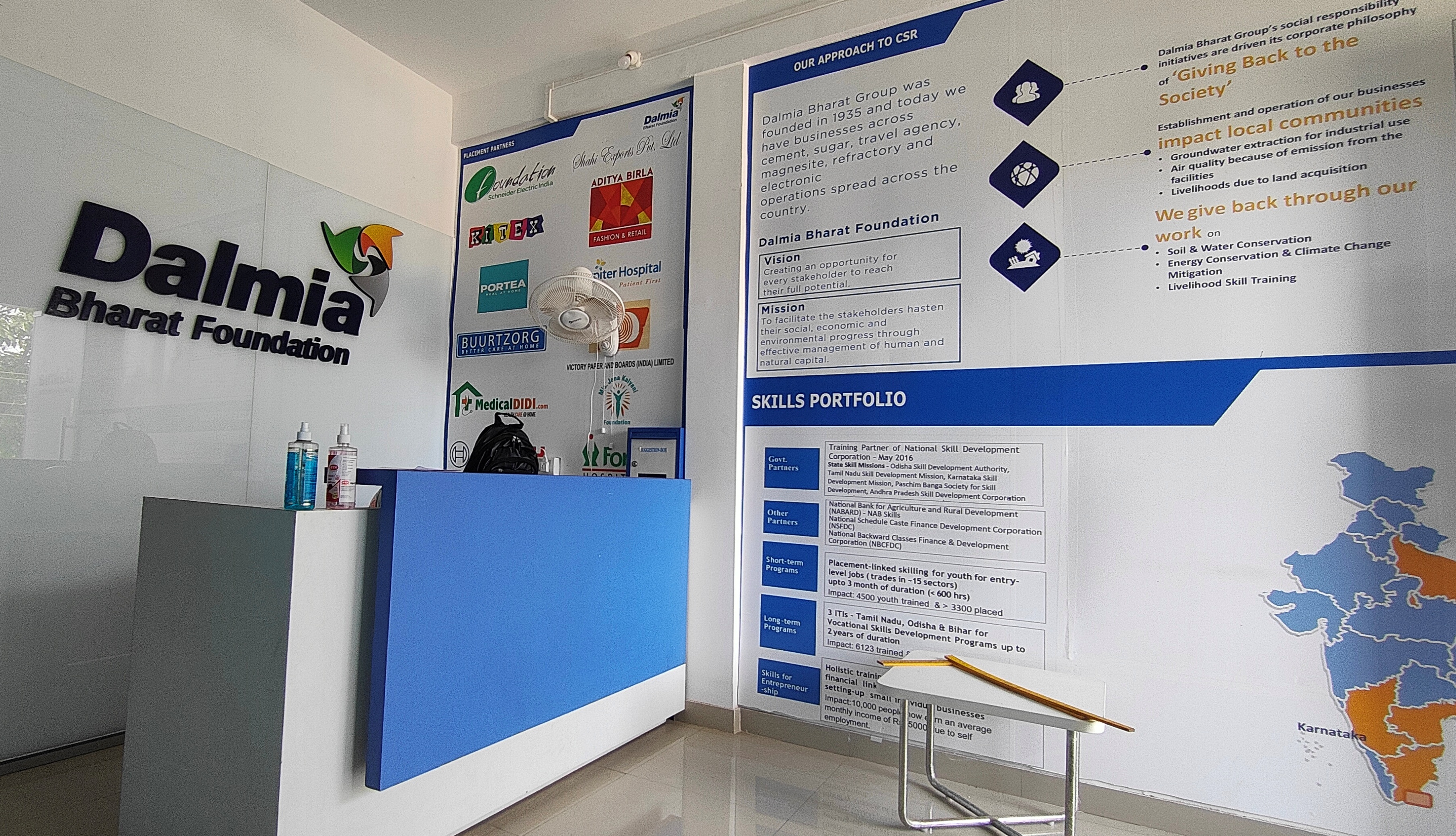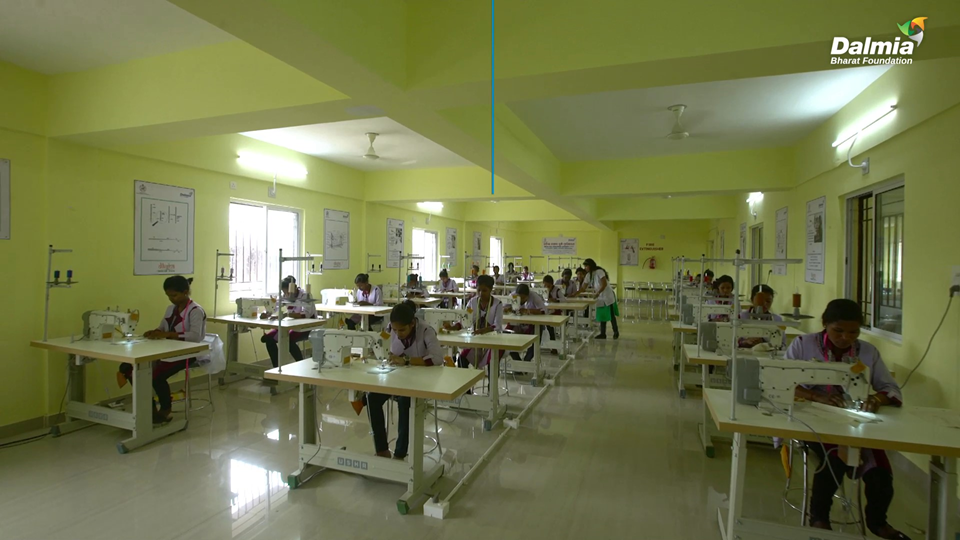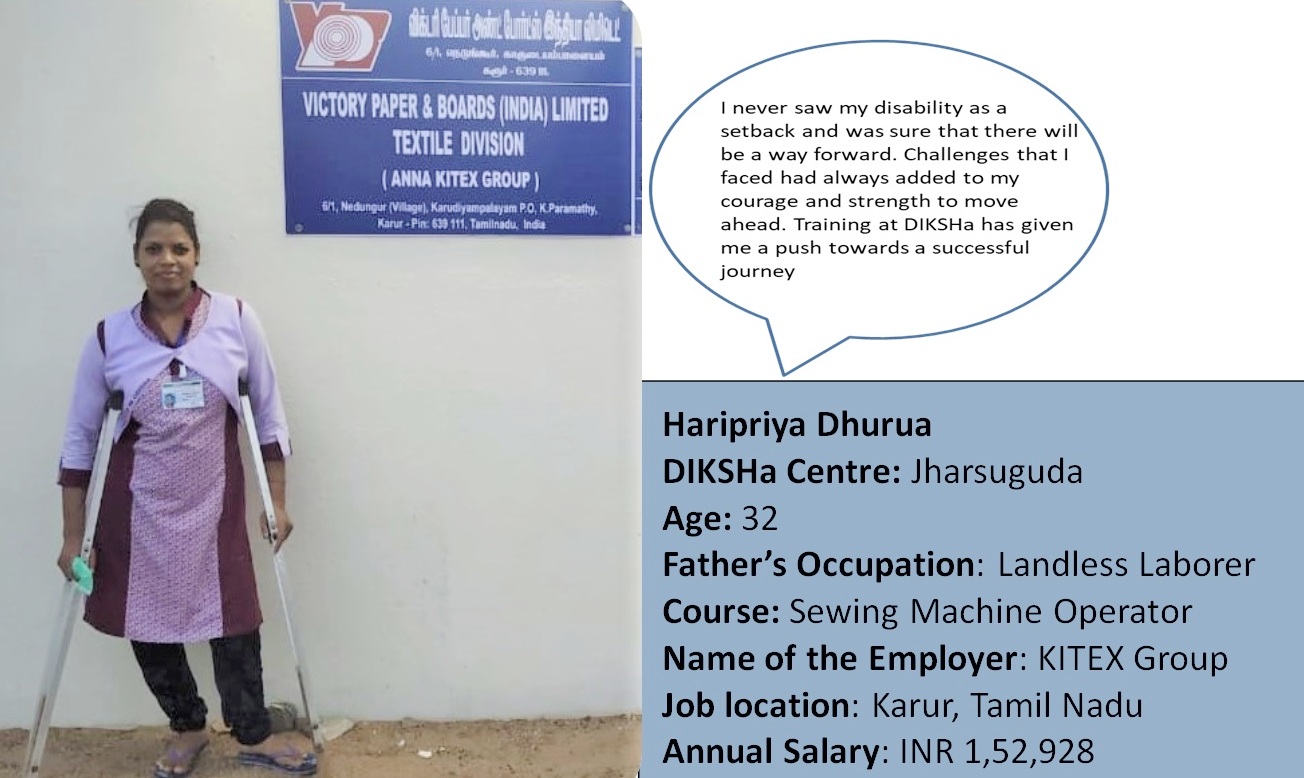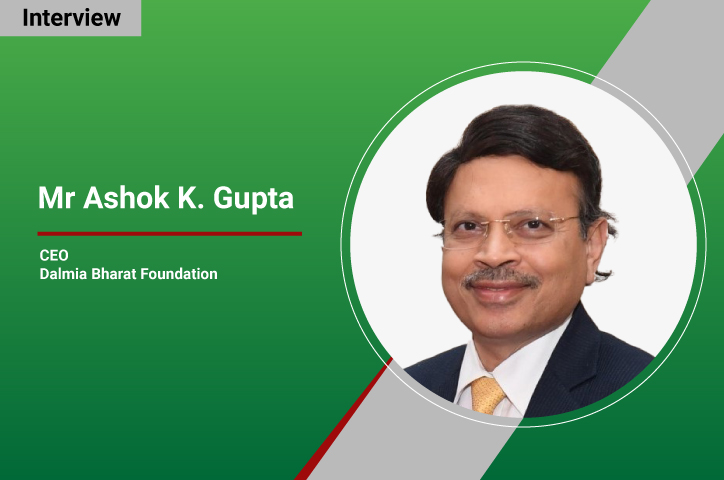In the realm of Corporate Social Responsibility (CSR), Dalmia Bharat Foundation (DBF) stands out as an organization that has successfully pioneered transformative initiatives that resonate far beyond the boardroom. This interview begins with the Foundation’s recent expansion of their flagship skill development program- DIKSHa and their commitment to train 1 lakh individuals by 2030. We get into the details of how the Foundation plans to achieve this ambitious goal while ensuring high quality of trainings and impressive 100% placement record maintained since the program’s inception in 2016.
While skilling is a major area of focus for DBF, the Foundation is equally active in climate action and social infrastructure. The discussion sheds light on the extensive work being done by them in both these domains with multiple corporate and NGO partners including Coca Cola, Bayer Crop Science, GIZ, NABARD, Solidaridad, HP India and Schneider Foundation.
In this insightful interview with TheCSRUniverse, Mr Ashok K. Gupta, CEO, Dalmia Bharat Foundation, takes us through their remarkable initiatives and explains how adaptability, innovation, and collaboration underpin DBF's unwavering pursuit of meaningful change. He also talks about their upcoming Gram Parivartan program which has been conceptualized with the central objective to provide an additional income of 1 lakh per annum to 82,000 households by 2026.
Read the full interview for more insights:
 Q. Dalmia Bharat Foundation (DBF) has been actively engaged in CSR initiatives for almost 15 years. What are the guiding principles and core values that shape the Foundation's approach to corporate social responsibility?
Q. Dalmia Bharat Foundation (DBF) has been actively engaged in CSR initiatives for almost 15 years. What are the guiding principles and core values that shape the Foundation's approach to corporate social responsibility?
A. We humbly acknowledge our significant and sustained engagement in CSR initiatives for nearly 15 years. At Dalmia Bharat Group, the creation of shared value is a core philosophy of the company's business strategy, and social responsibility has always been integral to our decision-making process.
Our approach towards CSR is deeply rooted in the company's core values, which include fostering inclusive growth and promoting a symbiotic relationship with society. We strive to leverage the potential of human and natural capital to drive social, economic, and environmental progress in the areas we operate in.
Q. Your flagship program- DIKSHa- was initiated in partnership with the National Skill Development Corporation (NSDC) in 2016. Please tell us about the conceptualization and designing of the program and the broad roles of DBF and NSDC in development and implementation.
A. With the concept of “Giving back to Society”, DIKSHa was designed as an alternative livelihood opportunity for the community around us. This reflects our shared vision of empowering individuals with valuable skills and enhancing employability. The conceptualization and design of the program were driven by a comprehensive analysis of prevailing skill gaps and industry demands for the trained youth in different trades. Our mission is clear: to reach and uplift every young individual within the vicinity of our business operations. This deliberate focus not only shapes skilled individuals but also creates a transformative impact in rural communities. As these trained youth step into a world of possibilities, they become catalysts for change, generating livelihood opportunities and significantly contributing to additional household income.
The broad roles of the Dalmia Bharat Foundation (DBF) and NSDC were integral to the development and implementation of DIKSHa. DBF played a crucial role in defining the program's focus areas, identifying trades with high market demand, and establishing state-of-the-art training centers equipped with modern tools and technology. Our commitment to community-centricity ensured that the program aligned with the specific needs of the regions we served. Our extensive network of industry partners facilitated linkages for placements, enabling our trainees to access job opportunities in the organized sector. On the other hand, NSDC provided expertise in skill development, bringing industry insights and standards to the table. They contributed to the curriculum's design, ensuring it met national standards and was in line with the National Skills Qualifications Framework (NSQF). Regular monitoring and evaluation mechanisms were established to measure the program's effectiveness and identify areas for improvement. This partnership continues to flourish, driving positive change in the lives of countless individuals across the nation.
Q. The program currently operates 15 centres across 10 states in India. What factors were considered for finalizing the locations and what are the expansion plans for the 8 new centers announced recently?
A. In line with the CSR policy the Dalmia Bharat Foundation (DBF) ensures that the communities around the business locations are benefitted from our skills training. Currently, the program operates 15 centers across 10 states in India, strategically chosen to make a positive impact on the communities near our operational sites.
Accordingly, as per our vision, these 8 new centers will also be established in the vicinity of Dalmia’s plants to extend the benefits of our CSR initiatives to more regions. The expansion will take place in states like Maharashtra, Jharkhand, Bihar, Odisha, Assam, Andhra Pradesh, and Tamil Nadu, enabling us to reach out to a broader spectrum of communities and make a more significant difference in their lives. Through these efforts, we aim to enhance the effectiveness and efficiency of our CSR efforts, maximizing the positive outcomes for the communities we serve.
 Q. DIKSHa has trained over 11,647 individuals since its inception eight years ago. The Foundation aims to skill 1 lakh individuals in the next seven years (2030). How do you plan to achieve this scale in such a short span of time?
Q. DIKSHa has trained over 11,647 individuals since its inception eight years ago. The Foundation aims to skill 1 lakh individuals in the next seven years (2030). How do you plan to achieve this scale in such a short span of time?
A. To achieve this scale in such a short span of time, we have devised a comprehensive plan that encompasses several key strategies. Firstly, expansion lies at the heart of our plan. We are set to establish 8 new centers in the current year, reaching out to more regions and communities in need of skill development opportunities. Additionally, in the fiscal year 2025, we plan to add 7 more centers, making a total of 30 operational centers, further broadening our reach. Moreover, to cater to diverse industry demands and align with changing market dynamics, we will introduce new trades in our training portfolio. This ensures that our trainees acquire highly relevant skills and are in demand, enhancing their employability prospects. Increasing the training capacity of each center is another essential aspect of our plan. By optimizing the utilization of resources and facilities, we can accommodate a larger number of trainees, thereby expediting our pace of skill development.
Apart from DIKSHa, we are also committed to extending our skilling efforts through various other modes. Our focus extends to training youth through initiatives such as Rural Self Employment Training Institutes (RSETi), Industrial Training Institutes (ITIs), and other skill development programs. Capacity building of Community-Based Organizations (CBOs) for livelihood activities is also a part of our comprehensive approach. By leveraging diverse platforms, we aim to reach a wider spectrum of individuals and communities, tailoring our training programs to suit specific needs and aspirations. These multi-dimensional efforts allow us to make a more profound impact on the lives of youth and create a skilled and employable workforce. The synergy between DIKSHa and other skilling modes strengthens our ability to achieve our target of skilling 1 lakh individuals by 2030. We are hopeful that we will be able to achieve our ambitious target.
Q. Up till now, DIKSHa has had an impressive 100% placement record with more than 5500 organized sector placements on good salaries and steady income growth. What measures do you have in place to ensure quality and standardization of trainings & placements as you scale up your program?
A. At DIKSHa, our commitment to providing high-quality training and ensuring standardized placements is paramount as we scale up our program. To maintain the quality and standardization of training while scaling up, we have planned to undertake several measures. First and foremost, we ensure that all trainees at our centers receive comprehensive and top-notch training. Our trainers are well-qualified and experienced in their respective fields, ensuring the delivery of a robust curriculum. We continuously invest in upgrading our training facilities and labs, adding new tools and equipment as required to keep pace with industry advancements. Additionally, all the trades offered at our DIKSHa centers are aligned with industry standards and adhere to the National Skills Qualifications Framework (NSQF) framework.
Moreover, we conduct an initial screening of candidates before selecting them for specific trades. Our focus is on choosing trades that have high market demand, ensuring better employment prospects for our trainees. Throughout the training process, we maintain a strict assessment procedure, leaving no room for compromise. This rigorous evaluation ensures that the skills acquired by our students are of the highest quality and meet industry expectations. Furthermore, we actively seek partnerships with various organizations and industries to facilitate the employment of our trainees. Through these efforts, we aim to continue our remarkable record of placements and empower individuals with the skills and opportunities for a successful future.
Q. Skilling is one of the strongest drivers of economic growth and probably the best way to empower people and communities. Are there any particular success stories that come to your mind wherein a beneficiary’s life was transformed after being trained under DIKSHa?
 A. There are several success stories that stand out. One such story is of Haripriya Dhurua, aged 32, from Brajarajnagar, Jharsuguda, Odisha. She has faced physical challenges since birth, with 50 percent disability due to Polio affecting both her legs. Despite her hardships, she was determined to pursue education and managed to study till class 6 in her village school. However, due to her disability and financial constraints, she couldn't continue her studies.
A. There are several success stories that stand out. One such story is of Haripriya Dhurua, aged 32, from Brajarajnagar, Jharsuguda, Odisha. She has faced physical challenges since birth, with 50 percent disability due to Polio affecting both her legs. Despite her hardships, she was determined to pursue education and managed to study till class 6 in her village school. However, due to her disability and financial constraints, she couldn't continue her studies.
Her family struggled to make both ends meet as her father was a landless farmer dependent on sharecropping. Living in impoverished conditions, Haripriya dreamt of being independent and financially supporting her family, but her leg deformity hindered her from realizing her aspirations.
She came across the Dalmia Institute of Knowledge and Skill Harnessing (DIKSHa), which offered free training in various courses. She decided to join the center, located 25 km away from her home and chose the trade of 'Sewing Machine Operator' due to its convenience for her physical condition.
With courage and determination, Haripriya attended classes daily, managing the travel cost with the stipend money provided by the Government of Odisha for the physically challenged. After completing the course successfully, she secured a job as a 'Sewing Machine Operator' in Victory Paper & Boards (A unit of KITEX Garments Group) in Karur, Tamil Nadu, earning a CTC of Rs. 12,744 per month.
Her story has inspired others in her community to pursue skill training for a sustainable livelihood. Haripriya now serves as a role model, approaching life with a positive outlook and optimism in facing challenges. Her current aim is to gain valuable experience in industrial stitching and save money to establish her own stitching shop back in her village, employing physically challenged girls from the area.
Q. Beyond skilling initiatives, DBF is also very active in Climate Action and Social Infrastructure domains. Could you share the highlights of your initiatives in these domains?
A. As part of our CSR action plan, we primarily concentrate on three core areas: Sustainable livelihoods, Climate Action, and Social infrastructure. DIKSHa is a flagship program of DBF that falls under the first focus area 1 i.e. sustainable livelihoods.
- For Focus Area 2- Climate Action, we embark on projects to conserve soil and water in the vicinity of our operational sites. These projects include constructing and maintaining Water Harvesting Structures, adopting Integrated Watershed Management, and promoting Micro Irrigation Practices like Drip Irrigation and Sprinkler Systems. We have also undertaken the Sustainable Sugarcane Farming project for 4 years duration, aimed at implementing environmentally friendly practices in sugarcane cultivation in partnership with Solidaridad, supported by Bayer & Coca-Cola. Apart from this, we have also undertaken a project in partnership with GIZ to promote bamboo as a biofuel in order to reduce our carbon footprint. The project aims to have a bamboo plantation with 6 lakh saplings, covering an area of 3000 acres and 4000 small & marginal farmers as bamboo aids Nitrogen fixation in the soil and reduces soil erosion.
- Under Focus Area 3- Social Infrastructure, we firmly believe that creating social infrastructure in rural areas is vital for holistic development and uplifting the lives of rural communities. Under this focus, we broadly concentrate on three dimensions: Health and Sanitation, Quality Education, and Rural Infrastructure. Our initiatives have benefited over 14,000 students with quality education in FY22-23. Through multi-specialty camps and various rural infrastructure projects, we have positively impacted more than 85,000 villagers cumulatively. Dalmia Bharat Foundation remains steadfast in its commitment to sustainable development and contributing to the well-being of the communities we serve.
Q. Collaboration and partnership play a crucial role in effective CSR initiatives. Who are the implementation partners for your major ongoing projects and what factors led you to choose them? Would you like to share any suggestions on how the outcome and impact of corporate-NGO partnerships could be elevated further?
A. At Dalmia Bharat Foundation, we believe that collaboration and partnership are vital for the success of our CSR initiatives. For our major ongoing projects, we have established partnerships with some renowned organizations such as NABARD, GIZ, Solidaridad, HP India, Schneider Foundation, etc. We chose these partners based on several factors that align with our vision of creating a significant and sustainable impact. Firstly, these partners offer substantial leverage in terms of expertise, resources, and outreach, enabling us to magnify the reach and effectiveness of our initiatives. Secondly, through cost-sharing arrangements, we can optimize the allocation of resources, maximizing the efficiency of our projects. Thirdly, their proven working models demonstrate efficiency and impact, which resonates with our values and goals.Moreover, our partners' strong brand value and credibility enhance the effectiveness of our projects and build trust among stakeholders, further strengthening our collective impact.
To elevate the outcome and impact of corporate-NGO partnerships further, we recommend fostering open communication, alignment of shared goals and transparent collaboration. Regular joint evaluations and sharing of best practices can lead to continuous improvement and better alignment of goals.
Q. CSR is an ever-evolving field with changing societal needs. How do you stay adaptable and responsive to emerging challenges while ensuring continuity in ongoing initiatives?
A. Dalmia Bharat Foundation (DBF) acknowledges the ever-evolving nature of CSR and the changing societal needs it addresses. To ensure adaptability and continuity in our initiatives, the foundation conducts initial need assessments in the communities we serve, enabling a deeper understanding of current challenges. We employ a flexible approach to CSR planning, allowing for timely adjustments and realignment of initiatives as per the changing landscape. Active collaboration with local organizations, NGOs, and stakeholders leverages collective expertise and resources, ensuring effective addressal of emerging challenges. Incorporating innovation and technology, we optimize our impact and address new challenges through cutting-edge solutions. Feedback mechanisms and a robust monitoring and evaluation framework assist in tracking progress and making necessary adjustments. Additionally, we conduct third-party impact assessments of our projects in all focus areas through renowned agencies such as Sattva, E&Y, Synergie, Scope, etc. By combining adaptability with continuity, we ensure that our CSR efforts remain relevant, impactful, and responsive to the changing needs of society over time.
Q. The world is moving towards the United Nations Sustainable Development Goals (SDGs). How does DBF align its CSR projects with specific SDGs to create a more significant and measurable impact?
A. At Dalmia Bharat Foundation (DBF), we firmly believe in aligning our Corporate Social Responsibility (CSR) projects with the United Nations Sustainable Development Goals (SDGs) to create a meaningful and measurable impact. Our CSR initiatives are carefully designed and executed to address specific SDGs that resonate with our core values and mission. Currently, DBF is proud to contribute to 13 out of the total 17 SDGs, showcasing our commitment to addressing a wide range of social, economic, and environmental challenges. Through meticulous planning and strategic partnerships, we try to target key areas such as education, healthcare, environmental sustainability, and livelihood enhancement, among others, to contribute to multiple SDGs simultaneously. By doing so, we ensure that our efforts address interconnected challenges and maximize the positive outcomes.
To measure the effectiveness of our initiatives, DBF employs rigorous monitoring and evaluation frameworks. We assess the progress regularly, gather feedback from beneficiaries and stakeholders, and make necessary adjustments to achieve greater efficiency and impact. By aligning our CSR projects with specific SDGs, we aspire to play a pivotal role in driving sustainable development and leaving a lasting positive footprint on the communities we serve.
Q. Looking ahead, what are the Foundation's future plans in your areas of focus? How do you see the organization's role evolving in the coming years to address the changing socio-economic needs of the communities you serve?
A. At Dalmia Bharat Foundation (DBF), we are committed to driving positive change and creating a lasting impact through our Corporate Social Responsibility (CSR) initiatives. Recently, we have launched the "Gram Parivartan" program, which holds a prominent place in our focus, emphasizing our dedication to promoting sustainable livelihoods. As we progress with the Gram Parivartan program, we recognize the evolving socio-economic needs of rural communities in the areas where we operate. These communities face various challenges, including limited income opportunities, lack of access to quality education and healthcare, and inadequate infrastructure. In response, the program's central objective is to provide an additional income of 1 lakh per annum to 82,000 households by 2026.
The program is designed to empower rural communities by promoting sustainable livelihoods, skill development, and entrepreneurship. Through this initiative, we aim to uplift the socio-economic status of these households, improve their living conditions, and create opportunities for self-sufficiency. The increased income will enable these households to access better education, healthcare facilities, and invest in infrastructure development within their communities. Furthermore, it will empower rural entrepreneurs to establish small businesses, enhance agricultural productivity, and participate in skill development activities.
Our focus on fostering sustainable livelihoods also aims to enhance economic resilience within these communities, leading to reduced migration to urban areas, and positively impacting the overall socio-economic fabric of the regions.





 Q. Dalmia Bharat Foundation (DBF) has been actively engaged in CSR initiatives for almost 15 years. What are the guiding principles and core values that shape the Foundation's approach to corporate social responsibility?
Q. Dalmia Bharat Foundation (DBF) has been actively engaged in CSR initiatives for almost 15 years. What are the guiding principles and core values that shape the Foundation's approach to corporate social responsibility? Q. DIKSHa has trained over 11,647 individuals since its inception eight years ago. The Foundation aims to skill 1 lakh individuals in the next seven years (2030). How do you plan to achieve this scale in such a short span of time?
Q. DIKSHa has trained over 11,647 individuals since its inception eight years ago. The Foundation aims to skill 1 lakh individuals in the next seven years (2030). How do you plan to achieve this scale in such a short span of time? A. There are several success stories that stand out. One such story is of Haripriya Dhurua, aged 32, from Brajarajnagar, Jharsuguda, Odisha. She has faced physical challenges since birth, with 50 percent disability due to Polio affecting both her legs. Despite her hardships, she was determined to pursue education and managed to study till class 6 in her village school. However, due to her disability and financial constraints, she couldn't continue her studies.
A. There are several success stories that stand out. One such story is of Haripriya Dhurua, aged 32, from Brajarajnagar, Jharsuguda, Odisha. She has faced physical challenges since birth, with 50 percent disability due to Polio affecting both her legs. Despite her hardships, she was determined to pursue education and managed to study till class 6 in her village school. However, due to her disability and financial constraints, she couldn't continue her studies.












.jpg)



